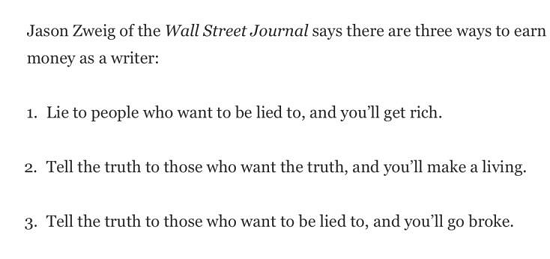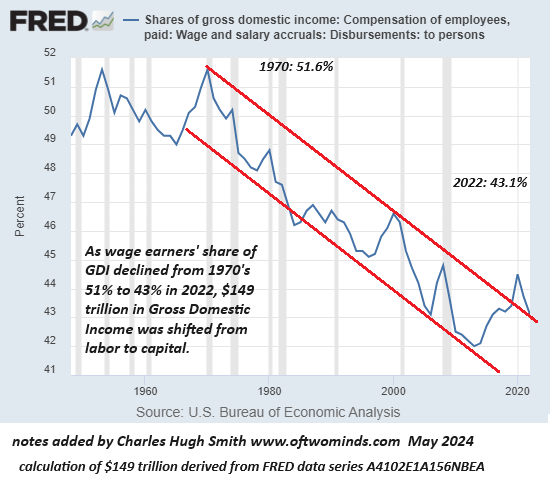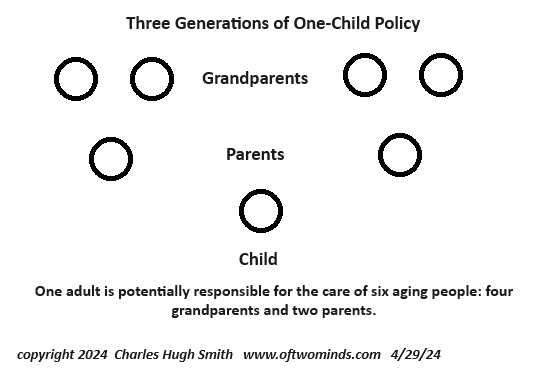I'm Looking for 10 Readers Willing to Pony Up a Few Bucks for the Crazy-Valuable Content Here
Sound of coins rattling in a battered bowl.
Every Spring, I rattle the begging bowl. (Thank you for not stepping on my frayed robe.)
So what's the value proposition for you, dear reader, of throwing a few coins in my battered bowl?
One way to answer is to ask: what do readers thank me for?
Readers thank me for the following:
Presenting the means to change the direction of their lives in positive ways.
Encapsulating what they sense but haven't yet articulated, i.e. validating their own intuition and observations.
Offering clarity and practicalities to advance their daily lives and long-term objectives.
Changing the direction of our lives is a powerful concept, for it embraces both 1) gaining insight into how the world is changing and 2) what we can do to adapt. Buckminster Fuller's description of trim tabs-- small control surfaces attached to the rudder steering the ship-- offers a useful analogy: modest changes can eventually change the course of mighty ships. The same is true of our own lives, if we choose our small course changes wisely.
The key trim tab is adaptability, which is the difference between grounded optimism and empty optimism:
Doom Porn and Empty Optimism.
In sum, readers discern my positive view of the future, my practical nature and my restless quest for a coherent understanding of open (i.e. rapidly evolving, unpredictable) systems and the chaotic trajectory of complex polycrisis.
The goal here is to fashion an island of coherence in an increasingly incoherent world dominated by legacy arrangements optimized for a world that is dissolving before our eyes. These legacy systems are obsolete, but lacking pain-free alternatives, the system keeps doing more of what's already failing.
The net result is that beneath the veneer of normalcy, systems that were once solid are melting into air, and this presents us with a novel challenge. How do we respond to this unmooring without becoming unmoored ourselves? Understanding what lies ahead gives us not certainty--there is none--but confidence that we're on a productive course.
As analyst Donella Meadows explained, all systems have leverage points where small adjustments can change the entire system. Meadows also noted that the way to change a system is to add a new source of information / feedback. This is what I endeavor to provide: leverage points in your own lives and a source of accessible (i.e. only takes a few minutes to read) insight.
The broad range of content here at Of Two Minds flows from 1) insights shared by readers and 2) what can I do to advance my own well-being and agency?
In other words, I focus on what one reader described in this way: "money richness and wealth are vastly different animals." Wealth is far more than money, for it includes ownership / control of our real-world skills, authenticity and trustworthy networks of other productive people. None of these can be bought off the shelf, so they will become increasingly valuable. I summarize this in my book Self-Reliance in the 21st Century.
The global economy is reaching limits that cannot be overcome, and this opens a path to a much more human-scale way of life that is sustainable rather than precarious. Sure, we can cling to the Waste is Growth Landfill Economy, but why self-destruct when a brighter future beckons?
Although I've conjured colorfully imaginary corporate sponsors (Kroika Cookie Company, The Best Kroika Ad Ever!), the fact is my only sponsors are likeminded independents like you.
(Sound of coins rattling in a battered bowl.) I'm asking 10 of you thousands of readers to join the daring, the foolhardy, the insanely generous few who become a patron / subscriber via Substack, Patreon, PayPal or US mail.
$7 a month or $70 a year gets you the weekly Musings Reports, the goal being to not just scrape through crises but emerge with greater skills, adaptability, health and forms of wealth that can't be expropriated.
Subscribers' data is confidential. No data is shared or sold. You receive nothing but the Weekly Musings.
If you need a doorstop, paperweight or sleep-aid, consider buying one of my books; they work splendidly in these utilitarian roles.
Thank you very much for considering supporting this beggar's-content-banquet with your hard-earned quatloos. Of Two Minds is soup to nuts. (Sometimes, just plain nuts, but there's a bit of entertainment value in the nuttiness.)
To those rare and precious souls who renew or launch subscriptions: thank you for enabling my work to continue (wai and bow).



New podcast: CHS on Leafbox (1:20 hrs)--authentic community, going grey, Doom Loops and more.
My recent books:
Disclosure: As an Amazon Associate I earn from qualifying purchases originated via links to Amazon products on this site.
Self-Reliance in the 21st Century print $18, (Kindle $8.95, audiobook $13.08 (96 pages, 2022) Read the first chapter for free (PDF)
The Asian Heroine Who Seduced Me (Novel) print $10.95, Kindle $6.95 Read an excerpt for free (PDF)
When You Can't Go On: Burnout, Reckoning and Renewal $18 print, $8.95 Kindle ebook; audiobook Read the first section for free (PDF)
Global Crisis, National Renewal: A (Revolutionary) Grand Strategy for the United States (Kindle $9.95, print $24, audiobook) Read Chapter One for free (PDF).
A Hacker's Teleology: Sharing the Wealth of Our Shrinking Planet (Kindle $8.95, print $20, audiobook $17.46) Read the first section for free (PDF).
Will You Be Richer or Poorer?: Profit, Power, and AI in a Traumatized World
(Kindle $5, print $10, audiobook) Read the first section for free (PDF).
The Adventures of the Consulting Philosopher: The Disappearance of Drake (Novel) $4.95 Kindle, $10.95 print); read the first chapters for free (PDF)
Money and Work Unchained $6.95 Kindle, $15 print) Read the first section for free
Become a $3/month patron of my work via patreon.com.
Subscribe to my Substack for free
NOTE: Contributions/subscriptions are acknowledged in the order received. Your name and email remain confidential and will not be given to any other individual, company or agency.
|
Thank you, Paul C. ($300), for your beyond-outrageously generous contribution to this site -- I am greatly honored by your steadfast support and readership. |
Thank you, Eugene K. ($20), for your most generous contribution to this site -- I am greatly honored by your support and readership. |
|
|
Thank you, Royce M. ($150), for your beyond-outrageously generous contribution to this site -- I am greatly honored by your steadfast support and readership. |
Thank you, Walt ($70), for your monstrously generous subscription to this site -- I am greatly honored by your support and readership. |




























